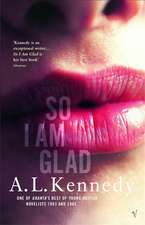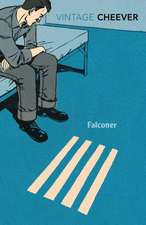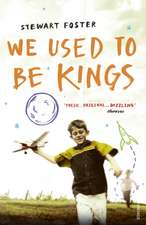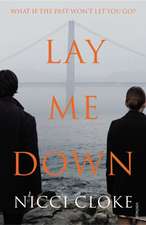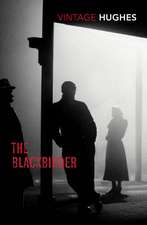Day
Autor A. L. Kennedyen Limba Engleză Paperback – 7 feb 2008
| Toate formatele și edițiile | Preț | Express |
|---|---|---|
| Paperback (2) | 105.33 lei 18-23 zile | +9.13 lei 7-13 zile |
| Vintage Books USA – 28 feb 2009 | 105.33 lei 18-23 zile | +9.13 lei 7-13 zile |
| Vintage Publishing – 7 feb 2008 | 106.03 lei 3-5 săpt. | +8.28 lei 7-13 zile |
Preț: 106.03 lei
Nou
Puncte Express: 159
Preț estimativ în valută:
20.29€ • 21.70$ • 16.92£
20.29€ • 21.70$ • 16.92£
Carte disponibilă
Livrare economică 27 martie-10 aprilie
Livrare express 13-19 martie pentru 18.27 lei
Preluare comenzi: 021 569.72.76
Specificații
ISBN-13: 9780099494058
ISBN-10: 0099494051
Pagini: 288
Dimensiuni: 131 x 199 x 22 mm
Greutate: 0.2 kg
Editura: Vintage Publishing
ISBN-10: 0099494051
Pagini: 288
Dimensiuni: 131 x 199 x 22 mm
Greutate: 0.2 kg
Editura: Vintage Publishing
Descriere
Alfred Day wanted his war. he found the wild, dark fellowship of his crew, and - most extraordinary of all - he found Joyce, a woman to love. Maybe it took him, too. Now in 1949, employed as an extra in a war film that echoes his real experience, Day begins to recall what he would rather forget...
Notă biografică
A. L. Kennedy has published four previous novels, one book of non-fiction, and one collection of short stories, Indelible Acts. She has twice been selected as one of Granta's Best of Young British Novelists and has won a number of prizes including the Somerset Maugham Award, the Encore Award and the Saltire Scottish Book fo the Year Award. She lives in Glasgow and is a part-time lecturer in creative writing at St. Andrews.
Extras
Alfred was growing a moustache.
An untrained observer might think he was idling, at a loose end in the countryside, but this wasn’t the case. In fact, he was concentrating, thinking his way through every bristle, making sure they would align and be all right.
His progress so far was quite impressive: a respectable growth which already suggested reliability and calm. There were disadvantages to him, certain defects: the shortness, inelegant hands, possible thinning at his crown, habit of swallowing words before they could leave him, habit of looking mainly at the ground—and those few extra pounds at his waist, a lack of condition—but he wasn’t so terribly ugly, not such a bad lot.
Mainly his problem was tiredness—or more an irritation with his tiredness—or more a tiredness that was caused by his irritation—or possibly both. He could no longer tell.
It wasn’t that he was awkward, or peculiar, quite the reverse: he was biddable and sensible and ordinary, nothing more: but even an ordinary person could sometimes have enough and get browned off and, for example, want to be offered, every now and then, a choice.
That was only reasonable, wasn't it? A man had to imagine he'd got a chance at freedom, a bit of space. The interval between alternatives, that gave you space. But sometimes you would consider yourself and all you could see were obstructions and you'd be amazed that you ever were able to leave your house—your bed, never mind your house. You'd look in the mirror some mornings and wonder why it didn’t show; the way most of you was always yelling to get out.
Moustache or no moustache, that wouldn't change.
The trouble was, you had too much to do: breathing, sleeping, waking, eating: you couldn't avoid them, were built to need them, and so they just went on and on. Where were the other possibilities, the changes you might want to make—like walking off beneath the ocean—not being a fish, he bloody hated fish, but being a man tucked away in the ocean, why couldn't he try that? Why couldn’t he try out whatever he thought?
And thinking itself, that wasn't helpful and yet you had to do it all the time. It was there when you dreamed, when you spoke, when you carried out your very many other compulsory tasks. If you couldn’t keep control and stay wary, you might think anything, which was exactly the one freedom you’d avoid. You could dodge certain thoughts, corkscrew off and get yourself out of their way, but they’d still hunt you.
You have to watch.
This morning he could feel them, inside and out, bad thoughts getting clever with him, sly. They lapped like dirtied water behind his face and outside him they thickened the breeze until the surface touching him, pressing his lips, was far more quick and complex than only air. Today it had the smell of blue, warm Air-Force blue: the stink of drizzle rising up from wool and everywhere the smell of living blue: polish and hair oil and that sodding awful pinky-orange soap and Woodbines and Sweet Caporal and those other cheap ones, the ones they gave away after ops: Thames cigarettes, to flatten out the nerves.
"Hello, looks like London Fog again."
Pluckrose had started them calling it London Fog: the Thames smoke haze in the briefing room—him first and then everybody. One of the things they had between them as a crew: "London Fog again."
But he wouldn't remember Pluckrose, wasn't going to ask him in.
Chop it. All right?
And this time I mean it. All right?
So the noise throttled back, obedient, let him be where he was.
Not that he was any too clear about that—his precise location—beyond the fact that he was sitting, sitting behind a young moustache.
They'd left the path an age ago, Alfred hadn't noticed when, and there was no doubt they were lost now, if they ever had known where to go. And that had been something of a pain, an irritation: arriving in nowhere, having to stumble and tramp along on a track that divided and twisted and then abandoned them completely: sent him sweating through ragged scrub behind a man who was a stranger—Vasyl—someone you heard about: rumours of bad history and a knife.
But this is fine. I am still enjoying my situation. It doesn’t worry me a bit. Because I am choosing to be happy. It's all so big and flat out here that I can have room for that.
And it's a fine day and good to get a rest, clear off out of it into the open. So I won't be downhearted: there’s no need.
Plus, at least this is peaceful and I always did appreciate a little peace. You can have enough of crowds. They pester your head.
One at a time, you could deal with people, but not crowds, and these last weeks had been very much less than deserted—being transported, lectured, ordered about—just like the old days—too much like the old days—you and the other volunteers. First rule of civilised life—never volunteer. So it’s sensible today, when you're not required, that you should go and catch your breath, get settled down, and nobody can do that with an audience: it's neither possible nor dignified.
Vasyl, of course, is not an audience and therefore doesn't count. Men you hear stories about take no interest in what you do. They let you carry on as you want to and pretend they haven’t seen. They act the way they hope you will for them.
It must have been a while since they'd packed in the walking, settled themselves on a patch of turf scattered with small yellow flowers he couldn't name. His view of the moorland was gently shuddering with heat and he realised he'd kicked pale dust all over his boots, his trouser cuffs. Everything he wore was loaned to him, not truly his responsibility, but still in some part of himself it was kit he was used to maintaining. Why else keep wearing it? He didn't have duties today, it wasn't necessary.
Look at you—filthy—all over the place—you'd have been torn off one for this, Day. You’d have put up a black for this. A proper disgrace to everyone concerned.
Sod it now, though, eh? No more playing silly buggers over that.
Not to mention that King's Regulations no longer apply.
And the dust, you might say, was so distant there at the far end of his body and nothing to do with up here and the neat, clean secrecy of private thought, invited thought.
A good roast of sun, it slows you, lets you relax—and out here if there's anything wrong, you can see it coming with bags of time to do what's next. This is the place and the weather for peace, for the cultivation of a friendly mind.
He wriggled his fingers and focused on enjoying the well-trained, emptied murmur that mildly ran his brain inside his skull, circulated the blood, kept him smooth and defended and working, imagining a thrum against his hands where they cuddled the back of his head and kept him from the lumps and buttons in his folded jacket. Battledress made a lousy pillow. You might almost think it had been invented with some other purpose in mind.
The wiry grass was pricking through his shirt, but that was quite calming for some reason, as was the din of insects, singing out around him for mile upon tussocky mile. Lying down like this: it was very good—a long time since he'd known it be so satisfactory and really improved by having this stranger with him, this Vasyl, this silly basket who was sitting and rocking and shifting and messing about, flicking an American lighter constantly, sucking on stolen American cigarettes. Very possibly he stole the lighter, too.
"D'you have to smoke that loudly?"
"I do, yes. I do." Funny accent, as if his tongue had been damaged, or was numb. "These are good. Highest quality. You want one?" And a dry voice, dulled—it made you feel some part of him had died, although you ignored that—nothing to do with you.
"I don’t smoke."
"Everybody smokes, Mr. Alfred."
"Then I must be nobody, Basil." Enjoying the thought of annoying a man it might be awkward to upset.
"Vasyl. Vasyl. Not a difficult name. A nice Ukrainian name. Also I can be called Slavko. This is another name I have. Better name.”
“You mean like a middle name? Like Basil Slavko.”
“I mean my other name. Other name for other things. Vasyl." That sounded as nettled as a dead voice could, but still was not satisfactorily upset.
"Where did you get the lighter?" And adding, "Vasyl," making sure to say it wearily and too loud, because nobody had to bother about people's names, not any more—insisting on details was absurd—and because maybe he wanted to pick a fight. Alfred wondered if this, in fact, was why he'd come—make a jaunt across the heath for exercise and education, have someone punch your lights out, then beetle off back. It would make a change.
But now Vasyl only giggled in a monotone that made Alfred feel slightly sickened and also ridiculous and, "You take one." The pack offered with a sharp little prod at his shoulder. "Have one. You would like." Vasyl leaning on his arm, breathing, sweating. "Real Chesterfields." His uniform possibly hotter than Alfred's.
Alfred waiting until the bleeder had retreated. "You have one for me. I'm nobody, remember? No other name. No other things."
"OK."
Alfred flicked a look across, caught Vasyl lighting a second cigarette, holding one in each hand at this point and grinning—deepish eyes staying worried, or certainly busy with some type of calculation, an urgency—but the mouth apparently friendly and content. Funny skin he had, pitted—made Alfred think of shrapnel, explosions. Which didn't suit his mood.
"And what you look like, I can’t say" Alfred subsided, realigned his head against his palms and stretched.
"I look like a man with a great many of cigarettes." An emphasis in this, sharp, and next a hacking laugh that funnelled quickly into coughing, silence, then a regular drag to the left, drag to the right.
I never did smoke, no matter what. They said that I would in the end, but I didn't. Ma told me not to—wouldn’t see me spending all my money and then she'd go mithering herself about accidents I could have—petrol and engines and fires. I told her she needn't worry. But you do what your ma says anyway, don't you, cocker? Have to try and keep to that.
And I sent her a bit of my money. Not enough.
Not that she asked.
She would never have asked.
I tried.
That's the thing. That I tried.
Oh, ar. I was a good boy. I've murdered and I stole and used big words, but I never smoked and I was a good boy. A grand lad, me.
The sky was staring down at Alfred, taking quite an interest suddenly, and he squinted up at it, felt a balance agreed between them, unwinding him, washing his limbs. "Must have been a storm somewhere." He was slow enough to stall completely, tip into a sweet, smooth drop.
"Ha?"
High gauzes and drags of cloud, in where the blue was strongest: he'd learned what that meant. "Cirrostratus . . . moisture . . . It freezes up there. Everything freezes up there." Catching the idea before it pushed in any further and turned nasty. "There’ll have been a storm somewhere. Earlier." And he was glad that he hadn't heard it, that no one had, because he was very much soothed at the minute, but you never knew what might become a strain, what might become a trouble for somebody. People were unpredictable—eventually, being with them always showed you the same thing: there was nothing on which to rely. Anyone could splinter in your face.
Bit bloody miserable that, though: isn’t it, our kid?
Which isn’t like us. We’re as happy as the bloody day is long.
Yes, but this bloody Day isn't bloody long. Five foot bloody four in my bloody socks, I thank you. That is short.
That is usefully short.
How Pluckrose always put it—"This is my friend and colleague, Sergeant Day, Alfred F. And, before you mention, he is not a stunted little bastard, he is usefully short. Couldn't fit him in the turret otherwise, could we?"
From the Hardcover edition.
An untrained observer might think he was idling, at a loose end in the countryside, but this wasn’t the case. In fact, he was concentrating, thinking his way through every bristle, making sure they would align and be all right.
His progress so far was quite impressive: a respectable growth which already suggested reliability and calm. There were disadvantages to him, certain defects: the shortness, inelegant hands, possible thinning at his crown, habit of swallowing words before they could leave him, habit of looking mainly at the ground—and those few extra pounds at his waist, a lack of condition—but he wasn’t so terribly ugly, not such a bad lot.
Mainly his problem was tiredness—or more an irritation with his tiredness—or more a tiredness that was caused by his irritation—or possibly both. He could no longer tell.
It wasn’t that he was awkward, or peculiar, quite the reverse: he was biddable and sensible and ordinary, nothing more: but even an ordinary person could sometimes have enough and get browned off and, for example, want to be offered, every now and then, a choice.
That was only reasonable, wasn't it? A man had to imagine he'd got a chance at freedom, a bit of space. The interval between alternatives, that gave you space. But sometimes you would consider yourself and all you could see were obstructions and you'd be amazed that you ever were able to leave your house—your bed, never mind your house. You'd look in the mirror some mornings and wonder why it didn’t show; the way most of you was always yelling to get out.
Moustache or no moustache, that wouldn't change.
The trouble was, you had too much to do: breathing, sleeping, waking, eating: you couldn't avoid them, were built to need them, and so they just went on and on. Where were the other possibilities, the changes you might want to make—like walking off beneath the ocean—not being a fish, he bloody hated fish, but being a man tucked away in the ocean, why couldn't he try that? Why couldn’t he try out whatever he thought?
And thinking itself, that wasn't helpful and yet you had to do it all the time. It was there when you dreamed, when you spoke, when you carried out your very many other compulsory tasks. If you couldn’t keep control and stay wary, you might think anything, which was exactly the one freedom you’d avoid. You could dodge certain thoughts, corkscrew off and get yourself out of their way, but they’d still hunt you.
You have to watch.
This morning he could feel them, inside and out, bad thoughts getting clever with him, sly. They lapped like dirtied water behind his face and outside him they thickened the breeze until the surface touching him, pressing his lips, was far more quick and complex than only air. Today it had the smell of blue, warm Air-Force blue: the stink of drizzle rising up from wool and everywhere the smell of living blue: polish and hair oil and that sodding awful pinky-orange soap and Woodbines and Sweet Caporal and those other cheap ones, the ones they gave away after ops: Thames cigarettes, to flatten out the nerves.
"Hello, looks like London Fog again."
Pluckrose had started them calling it London Fog: the Thames smoke haze in the briefing room—him first and then everybody. One of the things they had between them as a crew: "London Fog again."
But he wouldn't remember Pluckrose, wasn't going to ask him in.
Chop it. All right?
And this time I mean it. All right?
So the noise throttled back, obedient, let him be where he was.
Not that he was any too clear about that—his precise location—beyond the fact that he was sitting, sitting behind a young moustache.
They'd left the path an age ago, Alfred hadn't noticed when, and there was no doubt they were lost now, if they ever had known where to go. And that had been something of a pain, an irritation: arriving in nowhere, having to stumble and tramp along on a track that divided and twisted and then abandoned them completely: sent him sweating through ragged scrub behind a man who was a stranger—Vasyl—someone you heard about: rumours of bad history and a knife.
But this is fine. I am still enjoying my situation. It doesn’t worry me a bit. Because I am choosing to be happy. It's all so big and flat out here that I can have room for that.
And it's a fine day and good to get a rest, clear off out of it into the open. So I won't be downhearted: there’s no need.
Plus, at least this is peaceful and I always did appreciate a little peace. You can have enough of crowds. They pester your head.
One at a time, you could deal with people, but not crowds, and these last weeks had been very much less than deserted—being transported, lectured, ordered about—just like the old days—too much like the old days—you and the other volunteers. First rule of civilised life—never volunteer. So it’s sensible today, when you're not required, that you should go and catch your breath, get settled down, and nobody can do that with an audience: it's neither possible nor dignified.
Vasyl, of course, is not an audience and therefore doesn't count. Men you hear stories about take no interest in what you do. They let you carry on as you want to and pretend they haven’t seen. They act the way they hope you will for them.
It must have been a while since they'd packed in the walking, settled themselves on a patch of turf scattered with small yellow flowers he couldn't name. His view of the moorland was gently shuddering with heat and he realised he'd kicked pale dust all over his boots, his trouser cuffs. Everything he wore was loaned to him, not truly his responsibility, but still in some part of himself it was kit he was used to maintaining. Why else keep wearing it? He didn't have duties today, it wasn't necessary.
Look at you—filthy—all over the place—you'd have been torn off one for this, Day. You’d have put up a black for this. A proper disgrace to everyone concerned.
Sod it now, though, eh? No more playing silly buggers over that.
Not to mention that King's Regulations no longer apply.
And the dust, you might say, was so distant there at the far end of his body and nothing to do with up here and the neat, clean secrecy of private thought, invited thought.
A good roast of sun, it slows you, lets you relax—and out here if there's anything wrong, you can see it coming with bags of time to do what's next. This is the place and the weather for peace, for the cultivation of a friendly mind.
He wriggled his fingers and focused on enjoying the well-trained, emptied murmur that mildly ran his brain inside his skull, circulated the blood, kept him smooth and defended and working, imagining a thrum against his hands where they cuddled the back of his head and kept him from the lumps and buttons in his folded jacket. Battledress made a lousy pillow. You might almost think it had been invented with some other purpose in mind.
The wiry grass was pricking through his shirt, but that was quite calming for some reason, as was the din of insects, singing out around him for mile upon tussocky mile. Lying down like this: it was very good—a long time since he'd known it be so satisfactory and really improved by having this stranger with him, this Vasyl, this silly basket who was sitting and rocking and shifting and messing about, flicking an American lighter constantly, sucking on stolen American cigarettes. Very possibly he stole the lighter, too.
"D'you have to smoke that loudly?"
"I do, yes. I do." Funny accent, as if his tongue had been damaged, or was numb. "These are good. Highest quality. You want one?" And a dry voice, dulled—it made you feel some part of him had died, although you ignored that—nothing to do with you.
"I don’t smoke."
"Everybody smokes, Mr. Alfred."
"Then I must be nobody, Basil." Enjoying the thought of annoying a man it might be awkward to upset.
"Vasyl. Vasyl. Not a difficult name. A nice Ukrainian name. Also I can be called Slavko. This is another name I have. Better name.”
“You mean like a middle name? Like Basil Slavko.”
“I mean my other name. Other name for other things. Vasyl." That sounded as nettled as a dead voice could, but still was not satisfactorily upset.
"Where did you get the lighter?" And adding, "Vasyl," making sure to say it wearily and too loud, because nobody had to bother about people's names, not any more—insisting on details was absurd—and because maybe he wanted to pick a fight. Alfred wondered if this, in fact, was why he'd come—make a jaunt across the heath for exercise and education, have someone punch your lights out, then beetle off back. It would make a change.
But now Vasyl only giggled in a monotone that made Alfred feel slightly sickened and also ridiculous and, "You take one." The pack offered with a sharp little prod at his shoulder. "Have one. You would like." Vasyl leaning on his arm, breathing, sweating. "Real Chesterfields." His uniform possibly hotter than Alfred's.
Alfred waiting until the bleeder had retreated. "You have one for me. I'm nobody, remember? No other name. No other things."
"OK."
Alfred flicked a look across, caught Vasyl lighting a second cigarette, holding one in each hand at this point and grinning—deepish eyes staying worried, or certainly busy with some type of calculation, an urgency—but the mouth apparently friendly and content. Funny skin he had, pitted—made Alfred think of shrapnel, explosions. Which didn't suit his mood.
"And what you look like, I can’t say" Alfred subsided, realigned his head against his palms and stretched.
"I look like a man with a great many of cigarettes." An emphasis in this, sharp, and next a hacking laugh that funnelled quickly into coughing, silence, then a regular drag to the left, drag to the right.
I never did smoke, no matter what. They said that I would in the end, but I didn't. Ma told me not to—wouldn’t see me spending all my money and then she'd go mithering herself about accidents I could have—petrol and engines and fires. I told her she needn't worry. But you do what your ma says anyway, don't you, cocker? Have to try and keep to that.
And I sent her a bit of my money. Not enough.
Not that she asked.
She would never have asked.
I tried.
That's the thing. That I tried.
Oh, ar. I was a good boy. I've murdered and I stole and used big words, but I never smoked and I was a good boy. A grand lad, me.
The sky was staring down at Alfred, taking quite an interest suddenly, and he squinted up at it, felt a balance agreed between them, unwinding him, washing his limbs. "Must have been a storm somewhere." He was slow enough to stall completely, tip into a sweet, smooth drop.
"Ha?"
High gauzes and drags of cloud, in where the blue was strongest: he'd learned what that meant. "Cirrostratus . . . moisture . . . It freezes up there. Everything freezes up there." Catching the idea before it pushed in any further and turned nasty. "There’ll have been a storm somewhere. Earlier." And he was glad that he hadn't heard it, that no one had, because he was very much soothed at the minute, but you never knew what might become a strain, what might become a trouble for somebody. People were unpredictable—eventually, being with them always showed you the same thing: there was nothing on which to rely. Anyone could splinter in your face.
Bit bloody miserable that, though: isn’t it, our kid?
Which isn’t like us. We’re as happy as the bloody day is long.
Yes, but this bloody Day isn't bloody long. Five foot bloody four in my bloody socks, I thank you. That is short.
That is usefully short.
How Pluckrose always put it—"This is my friend and colleague, Sergeant Day, Alfred F. And, before you mention, he is not a stunted little bastard, he is usefully short. Couldn't fit him in the turret otherwise, could we?"
From the Hardcover edition.
Recenzii
“An imaginative tour de force that succeeds on every level, from its sparkling language to its narrative ingenuity to its devastating portrayal of wartime Europe.”
—San Diego Union-Tribune
“Kennedy faultlessly captures the brusque camaraderie of the bomber crew, men from vastly different backgrounds knitted together by a love so profound it can never be put in words.”
—The Washington Post
“[Kennedy] follows the examples of several of her contemporaries, including William Boyd and Sebastian Faulks, in writing about World War II, and in doing so makes that fertile territory very much her own. . . . Brilliant.”
—The Boston Globe
“Remarkable. . . . Day is a novel of extraordinary complexity.”
—The New York Review of Books
—San Diego Union-Tribune
“Kennedy faultlessly captures the brusque camaraderie of the bomber crew, men from vastly different backgrounds knitted together by a love so profound it can never be put in words.”
—The Washington Post
“[Kennedy] follows the examples of several of her contemporaries, including William Boyd and Sebastian Faulks, in writing about World War II, and in doing so makes that fertile territory very much her own. . . . Brilliant.”
—The Boston Globe
“Remarkable. . . . Day is a novel of extraordinary complexity.”
—The New York Review of Books


